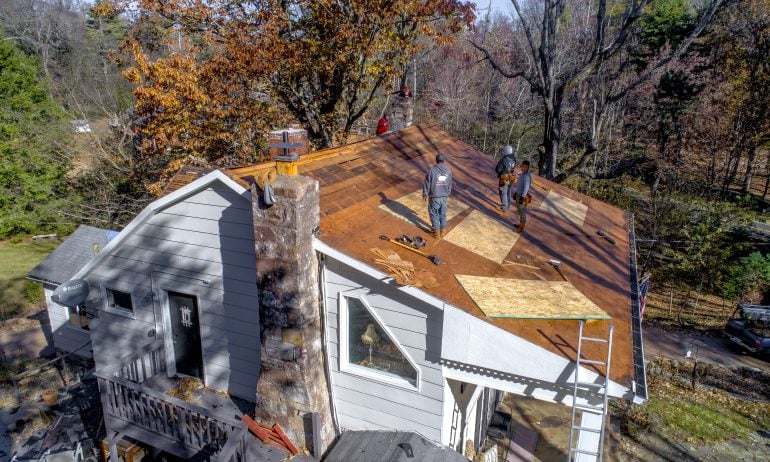The Home and Auto Insurance Crisis and How to Keep Your Coverage

Many, or all, of the products featured on this page are from our advertising partners who compensate us when you take certain actions on our website or click to take an action on their website. However, this does not influence our evaluations. Our opinions are our own. Here is a list of our partners and here's how we make money.
“Sheer panic.” That’s what Teddy Mars of Louisiana felt when his homeowners insurance company didn’t renew his policy in early 2023. The last remaining option left him and his family paying more for homeowners insurance than their mortgage.
To cover costs, Mars had to dip into his nest egg and withdraw $12,000 from his individual retirement account. “We're not sitting on a huge mountain of cash here,” Mars says. And opting out of insurance isn’t an option when you have a mortgage.
“It’ll break my heart, but I think we're going to have to leave,” says Mars, who grew up in Louisiana. But with a son in high school, it’s not easy to pack up and leave town. Plus, Mars worries about the saleability of his home. “Who wants to buy a house in our area when they can't insure it?”
Mars’ story is becoming all too familiar among Americans as climate catastrophes tear through the country with greater frequency and ferocity. Combined with inflation and an increase in auto accidents and thefts, many people are facing a crisis of affordability with home and car insurance.

See what you could save on car insurance
Easily compare personalized rates to see how much switching car insurance could save you.Homeowners are stuck between a rock and a hard place
A recent NerdWallet survey found that about 3 in 5 people with homeowners insurance say their premium has risen over the past 12 months. And around 1 in 10 are worried their insurer will stop doing business in their state.
It’s a valid concern. In Florida, for example, private homeowners insurance has gotten so scarce that Citizens, the state-funded “insurer of last resort,” is now its top property insurer by number of policies.
Many homeowners are even forgoing insurance altogether. A 2023 survey from the Insurance Information Institute found that 12% of homeowners don’t have homeowners insurance. Of those homeowners, roughly half have a household annual income of less than $40,000.
“It’s a bloodbath,” says Dori Einhorn, owner of California-based Einhorn Insurance, which specializes in wildfire insurance. “I've never seen anything so awful.” Einhorn is referring to the growing number of insurers no longer writing policies in the Golden State. “As long as global warming persists, I don't see how this is going to stop.”
Auto insurance rates are skyrocketing
It’s not just homeowners insurance that’s more difficult to lock down. Car insurance companies are scrutinizing the cars they insure while increasing the prices they charge. Just ask Gail Harlan of Florida.
After Harlan signed the papers to lease a 2023 Kia Seltos, she received new policy documents from her insurer. “I was in absolute shock,” Harlan recalls feeling after discovering she was paying much more for her new policy than she was for her last vehicle.
Harlan had been on a pay-per-mile car insurance program with her last car, a 2022 Honda CR-V. She was able to keep rates low since she didn’t clock many miles. Because Harlan couldn’t get on the same program with her new Kia Seltos, she had to get a regular, flat-rate policy. So, she went shopping.
Harlan got quotes from multiple insurance companies for much more than she was paying before. The highest quote she got was for more than $2,200 for a six-month policy. One large insurer even refused to give her a quote, citing a recent string of Kia and Hyundai thefts. This response came despite Harlan presenting an email from Kia explaining that her 2023 Kia Seltos was not considered at risk for those same types of thefts. “I figured this was going to be easy,” Harlan says.
And Harlan’s not alone. More than 1 in 6 car insurance owners say their premiums increased a lot in the past 12 months, according to the NerdWallet insurance survey. Car insurance costs rose 19% in August compared to the year prior, according to the latest data from the U.S. Bureau of Labor Statistics. Meanwhile, a growing number of Americans are simply opting out of car insurance.
America’s risk pool is leaking
When you buy insurance, your premiums go into a pool, along with everyone else’s premiums. Insurers draw from this pool to pay claims for the unfortunate few. The problem is, this pool is drying up for a lot of companies, forcing them to refill it by raising rates or kicking people out.
Here are a few things causing the leak:
Pricier claims. With the rise in extreme weather events and traffic deaths across much of the U.S., insurers are having to dig deeper in their pockets to cover claims. Inflation, supply chain snags and labor shortages have all added fuel to the fire.
The rising cost of “reinsurance.” Reinsurance — insurance for insurers — is becoming harder to get, pressuring home and auto insurers to steer clear of high-risk markets.
Friction between insurers and states. Home and auto insurance are regulated at the state level, so carriers are at the mercy of state legislation. For example, insurers face outsized losses in Florida because of a disproportionally high number of lawsuits. And many insurers have cited state-imposed rate hike limitations as a reason for pulling out of California.
There are faint glimmers of hope that insurers could plug the leak, including a recent U.S. Senate hearing on the property insurance market, signs of taming inflation and insurance reform in Florida.
But that’s probably not much comfort to the many Americans just trying to make ends meet. According to a 2023 survey from LendingClub, 3 in 5 Americans live paycheck to paycheck.
What you can do about it
If you’re having a hard time affording insurance premiums, or you’re worried your insurance company will drop you at renewal, here are six things you can do:
1. Shop around
Home and auto insurance premiums can vary dramatically by company. If you think you’re paying too much, do some shopping. Gather quotes from at least three different companies to make sure you’re getting the best deal possible. This approach worked for Harlan, who ultimately found a car insurance price she’s happy with.
2. Seek help
If your insurance options are limited, it may be time to recruit the help of an independent insurance agent. Local agents are familiar with your area and the companies still writing policies. “You need to find someone who knows what they're doing,” Einhorn cautions. “Find an agent who is responsive and who's not just looking to make a commission.”
3. Adjust your coverage
You can lower the cost of insurance if you’re able to assume more of the risk yourself. For example, you may be able to raise deductibles or drop optional coverages you no longer need. Just don’t reduce coverage to the point where you’d be wrecked financially if catastrophe strikes.
4. Get ahead of the problem
Insurers periodically inspect the homes they insure (or plan to insure). This is especially true for older homes in high-risk areas. Don’t give them a reason to drop or deny you coverage. Protect your home by clearing away nearby brush or overgrown trees, and make sure your roof and electrical, plumbing and HVAC systems are in good shape.
5. Research before you buy
If you’re thinking about buying a new home or car, check insurance quotes before you sign on the dotted line. That way, you won’t be caught off guard by an expensive policy you can’t afford. You can also gauge a property’s risk to climate change by plugging its address into riskfactor.com.
6. Don’t let your insurance lapse
While it may be tempting to skip paying a high premium, letting your insurance lapse can make a bad situation worse. Not only would you be fully responsible for any damages to your home or car, but future insurers may deem you risky to insure. This will likely translate into higher premiums when you decide to get insurance again, even if you had a valid excuse for the lapse. Not to mention, insurance is required if you have a car or mortgage.
On a similar note...


